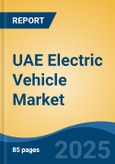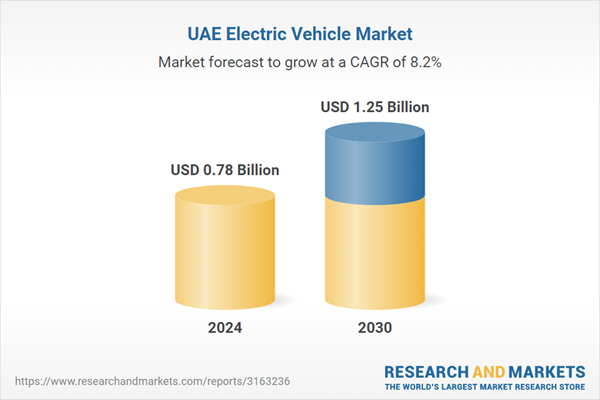Speak directly to the analyst to clarify any post sales queries you may have.
10% Free customizationThis report comes with 10% free customization, enabling you to add data that meets your specific business needs.
Major automotive players are launching new electric models tailored for the UAE market. In 2024, electric vehicle (EV) sales in the UAE grew by 38% year-on-year, fueled by rising fuel prices, greater availability of EV models, and increasing consumer confidence in EV technology. The strongest demand was seen in the compact SUV and sedan categories, highlighting a preference for practical, city-friendly vehicles. This shift in consumer behavior, supported by economic and technological factors, is a key driver of market demand
Key Market Drivers
Strong Government Support and Visionary Policies
One of the primary drivers of the UAE electric vehicle market is the proactive support and vision demonstrated by the government. The UAE has set ambitious sustainability goals through initiatives like the UAE Net Zero 2050 Strategic Initiative and Dubai Clean Energy Strategy 2050, both of which emphasize a reduction in carbon emissions and the adoption of cleaner transportation alternatives.In line with these objectives, several regulatory policies and incentives have been introduced to encourage the use of EVs. These include waiving registration and renewal fees, free public parking, exemption from toll charges (Salik), and access to dedicated green vehicle lanes in some emirates. Authorities such as the Dubai Electricity and Water Authority (DEWA) and Abu Dhabi Department of Energy are playing a vital role in pushing the electrification agenda forward. The UAE’s leadership is actively working to position the country as a global hub for clean mobility, making government backing a critical growth catalyst.
Key Market Challenges
High Upfront Cost of Electric Vehicles
One of the primary challenges hindering the widespread adoption of electric vehicles in the UAE is the relatively high initial purchase cost compared to internal combustion engine (ICE) vehicles. While EVs promise long-term savings through lower operating and maintenance costs, the upfront price remains a major barrier for middle-income consumers. This is particularly significant in a price-sensitive segment of the market that prioritizes affordability over sustainability. Imported EV models, especially premium brands like Tesla, BMW, and Audi, often come with hefty price tags due to import duties, shipping costs, and the absence of local manufacturing.Moreover, battery production - which constitutes a large portion of an EV’s cost - is still expensive, despite global efforts to scale and optimize it. Although the UAE government provides incentives such as free parking and registration fee waivers, there are currently no direct subsidies or tax rebates on EV purchases, unlike some Western and Asian countries. Without significant price reductions or financing support, many consumers still view EVs as luxury or niche products, slowing mass-market adoption.
Key Market Trends
Strategic Partnerships and Automotive Innovation
Strategic collaborations between government entities, international automakers, technology providers, and energy companies are also fueling the growth of the EV market in the UAE. Several joint ventures and public-private partnerships have emerged to develop EV production, infrastructure, and service ecosystems. For instance, Etihad Rail, ADNOC Distribution, and Bee'ah have launched initiatives to incorporate EVs into their fleets.International OEMs such as Nissan, Tesla, Hyundai, and BYD are introducing their latest electric models to the UAE market, supported by localized marketing and service centers. Additionally, innovation in battery technology, autonomous driving features, and smart mobility solutions is making EVs more appealing and accessible. The integration of digital platforms, predictive maintenance, and AI-based performance monitoring is enhancing the ownership experience. The UAE’s open approach to innovation and foreign investment makes it an attractive destination for automakers to pilot advanced mobility solutions, ultimately reinforcing the EV market’s long-term prospects.
Key Market Players
- Hyundai Motor Company
- Tesla, Inc.
- Volkswagen Motor Company LTM
- General Motors Company
- Groupe Renault
- BMW AG
- Ford Motor Company
- One Moto Technologies LTD.
- Rivian, LLC
- Mitsubishi Fuso Truck and Bus Corporation
Report Scope:
In this report, the UAE Electric Vehicle Market has been segmented into the following categories, in addition to the industry trends which have also been detailed below:UAE Electric Vehicle Market, By Vehicle Type:
- Two-Wheeler
- Passenger Car
- LCV
- M&HCV
UAE Electric Vehicle Market, By Range:
- 0-50 Miles
- 51-150 Miles
- 151-200 Miles
- 201-400 Miles
- above 400 Mile
UAE Electric Vehicle Market, By Propulsion:
- BEV
- HEV
- PHEV
- FCEV
UAE Electric Vehicle Market, By Region:
- Dubai
- Abu Dhabi
- Sharjah
- Ajman
- Rest of UAE
Competitive Landscape
Company Profiles: Detailed analysis of the major companies present in the UAE Electric Vehicle Market.Available Customizations:
With the given market data, the publisher offers customizations according to a company's specific needs. The following customization options are available for the report.Company Information
- Detailed analysis and profiling of additional market players (up to five).
This product will be delivered within 1-3 business days.
Table of Contents
Companies Mentioned
- Hyundai Motor Company
- Tesla, Inc.
- Volkswagen Motor Company LTM
- General Motors Company
- Groupe Renault
- BMW AG
- Ford Motor Company
- One Moto Technologies LTD.
- Rivian, LLC
- Mitsubishi Fuso Truck and Bus Corporation
Table Information
| Report Attribute | Details |
|---|---|
| No. of Pages | 85 |
| Published | July 2025 |
| Forecast Period | 2024 - 2030 |
| Estimated Market Value ( USD | $ 0.78 Billion |
| Forecasted Market Value ( USD | $ 1.25 Billion |
| Compound Annual Growth Rate | 8.2% |
| Regions Covered | United Arab Emirates |
| No. of Companies Mentioned | 10 |









